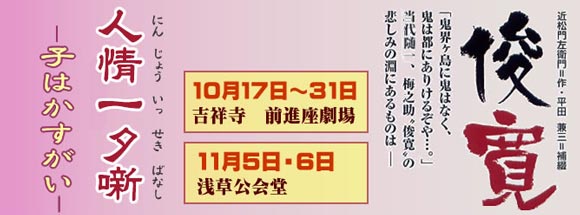| Comments |
Heike Nyogo no Shima: there are few plays as universally popular
as the story of Shunkan, a rebellious monk exiled to a remote island along with
two companions, all conspirators against Taira no Kiyomori, the powerful dictator
that rules Japan. They are pardoned, but Shunkan sacrifices himself so
that one of his companions can leave together with his new wife, a fishing
girl named Chidori. In the end, Shunkan, now alone forever, waves at the
ship bearing his companions until it disappears in the distance.
This play is actually one act of a long play by the great writer Chikamatsu Monzaemon (1653~1724) entitled "Heike Nyogo no Shima" first performed as a
puppet play in 1719. The original play is loosely based on historical events
and the entire play has spectacle and a grand scale that sets off the intense
human drama of the one act that is usually performed.
In 1967, the National Theatre revived the first act
that takes place in Kiyomori's mansion and this production will feature both
this scene and the more famous act that contains the heart of the drama.
Starring Matsumoto K˘shir˘ as Shunkan, Band˘ Hikosabur˘ as Kiyomori, Nakamura Baigyoku as the good messenger Tanzaemon,
Ichikawa Komaz˘ as Shunkan's wife Azumaya, Ichikawa Danshir˘ as the evil messenger Senoo, Nakamura Shibajaku as the island girl Chidori
and Ichikawa Somegor˘ as Shunkan's companion Naritsune.
Kiyomori Yakata:
(Kiyomori's Mansion at Rokuhara)
After attempting to overthrow the tyrant Kiyomori, the priest Shunkan and his
companions have been exiled. Kiyomori summons Shunkan's wife Azumaya and attempts
to force her to wait on him personally but instead she commits suicide,
berating Kiyomori for his crimes.
Shunkan:
(Shunkan's Exile on Devil's Island)
After three years on the island, a ship comes for the exiles. But Shunkan's name
is not on the list of the pardoned carried by the evil Senoo. However, there
is another pardon carried by another official. When they try to board the ship,
Senoo refuses to allow Chidori, the young wife of one of the exiles,
to board since her name does not appear on the list. Shunkan tries to
help and Senoo contemptuously tells him that his beloved wife is dead.
With nothing but emptiness awaiting him in the capital,
Shunkan decides to kill Senoo and put Chidori on the ship.
As the ship leaves, Shunkan waves until they disappear in the distance.
Uguisuzuka: this is the first performance of this play in a
large theater in 78 years. Originally a story in an early 19th century comic book,
it was dramatized on the Kabuki stage in 1832 and was performed frequently
during the 19th century, often in smaller theatres where it was a favorite for
its over-the-top, romantic scenes. A beautiful girl named Umegae falls in love
with a poor beggar when his falcon catches her pet warbler. In fact,
he is the samurai Sasaki Gennosuke, who is in disguise to avenge the death
of his father. Umegaeĺs lady-in-waiting Ikuyo persuades the two young people
to get together. Umegae and Gennosuke get married, but her fatherĺs evil second
wife Tamaki tries to use this as an occasion to humiliate the young couple
and take over the estate for herself. But Gennosuke handily deals with her
challenges of difficult problems of etiquette and gives a dazzling display of
his fighting skills. Yodo Yozaemon, the lord of Yodo Castle is at the banquet
and realizes Gennosukeĺs true identity. Meanwhile, Tamaki also has a love
affair with a priest named Daijinb˘, and the two dream up all sorts of evil
schemes together. Starring Matsumoto K˘shir˘ as Yozaemon, Nakamura Baigyoku as Umegaeĺs father Saemon,
Nakamura Shibajaku as Umegaeĺs lady-in-waiting Ikuyo, Nakamura T˘z˘ as Tamaki and Ichikawa Somegor˘
in the two roles of the hero Gennosuke and the villainous priest Daijinb˘.
Source: Earphone Guide website
|



